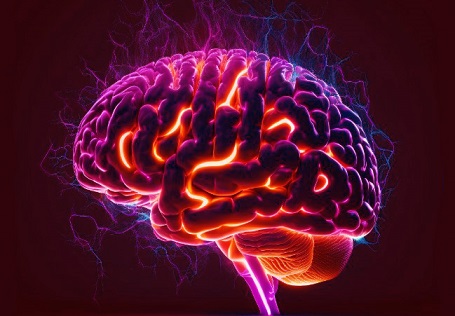One in Three COVID-19 Survivors Are Diagnosed with a Neuropsychiatric Condition Within Six Months of Recovery
Nikhil Prasad Fact checked by:Thailand Medical News Team Nov 22, 2024 4 months, 3 weeks, 13 hours, 21 minutes ago
Medical News: Rising Neuropsychiatric Concerns in COVID-19 Survivors
Recent studies have unveiled an alarming trend among COVID-19 survivors: one in three individuals is diagnosed with a neuropsychiatric condition within six months of recovery. This data highlights the profound mental and neurological toll of the virus, which extends beyond its immediate physical effects. Researchers from institutions such as "Victor Babeș" University of Medicine and Pharmacy in Timișoara and the "Lucian Blaga" University of Sibiu, Romania, have provided critical insights into these post-recovery complications.
 One in Three COVID-19 Survivors Are Diagnosed with a Neuropsychiatric Condition
One in Three COVID-19 Survivors Are Diagnosed with a Neuropsychiatric Condition
Within Six Months of Recovery
This
Medical News report delves into the study findings that underscore the significant neuropsychiatric burden faced by COVID-19 survivors. It is evident that these lingering effects demand both public health attention and targeted healthcare responses to mitigate long-term impacts.
Neuropsychiatric Conditions: A Post-COVID-19 Reality
The spectrum of neuropsychiatric conditions affecting survivors includes anxiety, depression, cognitive impairments, and in severe cases, psychosis. These findings emerged from a retrospective analysis of patient data, which revealed that 36% of hospitalized patients exhibited neurological symptoms during the acute phase of the disease. In the months following recovery, 33% of survivors reported new or recurring mental health issues, with 13% experiencing their first-ever diagnosis of a neuropsychiatric condition.
The Role of Neuroinflammation
A key driver of these conditions is neuroinflammation triggered by the virus. SARS-CoV-2’s ability to invade the central nervous system (CNS) and disrupt normal brain functions has been linked to its interaction with ACE2 receptors, which are highly expressed in neuronal tissues. This interaction, compounded by a "cytokine storm," leads to brain inflammation, endothelial damage, and the breakdown of the blood-brain barrier (BBB). These mechanisms collectively contribute to neurological symptoms such as brain fog, memory deficits, and emotional instability.
Long COVID and Its Persistent Effects
For many survivors, the journey to full recovery remains elusive. Long COVID syndrome, characterized by symptoms lasting more than 12 weeks post-infection, frequently includes neuropsychiatric manifestations. These symptoms range from mild headaches and insomnia to debilitating cognitive impairments and mood disorders. An Italian study cited in the research found that 78% of COVID-19 survivors experienced cognitive deficits, with 36% reporting depressive symptoms linked to persistent inflammation.
Children and Neurodevelopmental Risks
Interestingly, children recovering from COVID-19 face distinct challenges. Studies highlight an increased risk of neurodevelopmental issues such as ADHD
-like symptoms, possibly due to disruptions in routine and prolonged inflammation. Moreover, children with multisystem inflammatory syndrome (MIS) exhibit a higher prevalence of long COVID symptoms, including neuropsychiatric manifestations.
Management and Multidisciplinary Approaches
Managing these conditions requires a holistic approach. Supportive care, anti-inflammatory treatments, and psychological interventions are critical. Pharmaceutical options such as antidepressants and antipsychotic medications may be prescribed based on individual needs. In cases of severe neuroinflammatory symptoms, advanced therapies targeting cytokines like IL-6 have shown promise.
Healthcare systems must integrate multidisciplinary teams to address the physical, cognitive, and emotional aspects of post-COVID recovery. Public health strategies should prioritize mental health support alongside routine medical care for survivors.
Need for Continued Research and Awareness
The evolving nature of the pandemic underscores the need for ongoing research into the long-term effects of COVID-19. Identifying biomarkers that predict neuropsychiatric risks and developing targeted treatments can help reduce the burden on survivors and healthcare systems alike.
Conclusion
The aftermath of the COVID-19 pandemic extends far beyond its acute phase, revealing a staggering prevalence of neuropsychiatric conditions among survivors. This highlights the urgent need for a comprehensive public health response to address these lasting impacts. From understanding the underlying mechanisms of neuroinflammation to offering tailored treatments, the healthcare community must rise to the challenge of supporting survivors on their journey to recovery.
The study findings were published in the peer-reviewed journal: Viruses.
https://www.mdpi.com/1999-4915/16/12/1811
For the latest COVID-19 News, keep on logging to Thailand
Medical News.
Read Also:
https://www.thailandmedical.news/news/covid-19-news-german-study-shows-that-covid-19-is-also-triggering-the-new-onset-of-psychiatric-disorders-in-many
https://www.thailandmedical.news/news/even-mild-covid-19-is-causing-new-onset-of-psychiatric-disorders-in-children
https://www.thailandmedical.news/news/most-long-covid-patients-likely-to-develop-new-onset-psychiatric-disease
https://www.thailandmedical.news/news/breaking-covid-19-news-various-studies-and-case-reports-validate-that-sars-cov-2-can-cause-bipolar-disorder
https://www.thailandmedical.news/news/covid-19-news-sars-cov-2-infections-can-trigger-onset-of-bipolar-disorder
https://www.thailandmedical.news/news/italian-researchers-warn-that-covid-19-infections-can-cause-catatonia-a-neuropsychiatric-condition
https://www.thailandmedical.news/news/breaking-covid-19-news-italian-researchers-warn-that-sars-cov-2-infections-can-lead-to-new-onset-psychosis-expect-more-loonies-walking-around
https://www.thailandmedical.news/news/japanese-case-study-shows-new-onset-of-schizophrenia-in-adolescent-post-covid-19
https://www.thailandmedical.news/news/good-news-for-criminals-and-lawyers-as-new-mitigating-factor-found-study-review-validates-that-covid-19-vaccines-trigger-new-onset-psychosis
https://www.thailandmedical.news/news/covid-19-news-new-york-doctors-warn-that-even-mild-covid-19-can-lead-to-anti-n-methyl-d-aspartate-autoimmune-encephalitis-with-psychotic-symptoms
https://www.thailandmedical.news/news/germany-study-uncovers-alarming-link-between-neural-autoantibodies-and-psychiatric-symptoms-in-covid-19-and-post-covid-individuals
